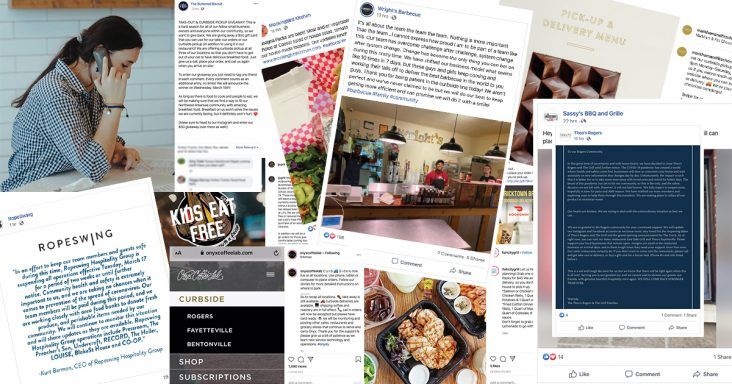COVID-19 forces restaurant owners to cope with sudden new realities
by April 1, 2020 10:20 am 1,575 views

The list of small businesses impacted by the COVID-19 (coronavirus) national emergency is extensive.
In the second week of March, the World Health Organization officially classified COVID-19 as a pandemic. Authorities immediately recommended — and eventually mandated — measures designed to keep people indoors and away from others as a way to reduce the spread of the respiratory illness.
One week later, the National Federation of Independent Business (NFIB) reported that 76% of small businesses (under 360 employees) described the disruption as profound.
Those actions, though necessary from a healthcare standpoint, crippled commerce. Restaurant owners are among those taking a financial jolt like nothing they’ve ever experienced. Whether it’s casual dining, fast-food or full-service restaurants, from large national chains or locally owned food trucks, no enterprise has escaped the collateral damage of the COVID-19 health crisis.
In Northwest Arkansas, owners are taking different and creative approaches to blunt the impact of sharp business decline as best they can.
Some businesses opted to keep their kitchens open and transitioned to alternate hours and business models of offering food via drive-thru, takeout, curbside pickup and delivery. Others suspended operations entirely.
They all share a common goal, however — finding a way to survive an unclear timeline and hoping the tough decisions they make will be enough to stay in business in the long-term.
“This is a generational event we’re going through right now,” said Jeff Hodges, owner of Springdale-based restaurant/sports bar chain Foghorn’s. He owns six locations, with two in Fayetteville and one each in Springdale, Rogers, Siloam Springs and Conway. He decided on March 21 to close them all. “It’s hard for me to get gung-ho and say, ‘This is what we’re going to do.’ I did that for two or three days, and I was mentally exhausted. We had to pivot every single day with new information. At some point, you cut your losses, regroup and live to fight another day. You try to come back stronger.”
As confirmed cases of novel coronavirus continue to grow exponentially, so has the fear and uncertainty in the restaurant business, a nearly $900 billion industry with over 1 million U.S. locations and 15.6 million workers.
In Arkansas, those feelings were amplified March 20 when Gov. Asa Hutchinson announced an order that prohibited restaurants from serving customers food or alcohol on the premises.
Hodges suspended operations the following day and laid off roughly 180 workers. He tried to keep the restaurant afloat with ramped up pickup and delivery service for a few days. He termed it a Band-Aid approach that wasn’t feasible, especially for a sports bar model, where patrons come not just to eat but to visit with friends, watch sports on TV and drink responsibly. With American sports on pause for the foreseeable future, that compounded the problem for Hodges and made his choice clear.
“Drive-thru and delivery and pickup is a short-term fix, in my opinion,” Hodges said. “If this thing [COVID-19] keeps rolling like it is, I think even that is going to slow down pretty dramatically. You’re digging a deeper hole for most [restaurants] unless you’re fast food or set up for a drive-thru. I could be wrong. We’re ready to go back to that model once we see some light at the end of the tunnel, as far as seeing the peak [of infection] or seeing it go down.”
Like most in his position — eight in 10 restaurant owners started their industry careers in entry-level positions, according to the National Restaurant Association — Hodges has built his company from the ground up. And in doing so, he has taken on no equity partners.
“For me, that would be ‘Plan Double Z’ before I ever brought in an equity investment,” he said. “But that is always an option.”

Hodges graduated from the University of Arkansas in 1997 with a double major in financial management and accounting. He opened the first Foghorn’s on College Avenue in Fayetteville in March 2004. He says the company has no debt, and everything in the restaurant is 100% owned. Of the six Foghorn’s locations, only one is in leased space.
“The only notes I have are the real estate,” he said. “The banks have been great to work with, and I’ll be paying interest only [on the loans] for six months on all my commercial properties.”
To cut as much overhead as possible, Hodges said he’s turned off the gas and air conditioning at all locations but has enough electricity to keep at least one walk-in freezer operating at each site to save some product. He has also reduced trash collection services and worked with cable and satellite television providers to suspend service.
“I think maybe in 30 days we can get back to limited capacity,” he said. “I think I could hold out like this for six months if I had to. I wouldn’t like it. We’re all taking a pay cut from here on out. The thing I’ve guaranteed my people is, you will have a job coming out of this. Just as fast as I can. My employees are what’s going to make this work, coming out of this.”
SURVIVAL MODE
Other restaurant owners are also mapping out strategies for survival and business continuity, alerting patrons nearly every day of their plans through social media.
Brett Brundige, owner of Fish City Grill seafood restaurants in Rogers and Fort Smith, explained the nearly two-month season of Lent is significant to the business, which had fallen 45% over the weekend of March 13 and was down 80% for most of the week of March 15. He expected sales to be a fraction of what they had been as a result of the statewide mandate ending dine-in service.
His two restaurants had between 80 and 90 employees combined, but workers started to be laid off March 20. Brundige was working on setting up third-party delivery services but also looked to keep hourly employees on staff to deliver.
When asked how the virus has impacted his business, Brundige said March 20, “it’s completely turned it on its head, and it’s a different business now than it was a week ago.” He’s looking to suspend TV services for his restaurants to cut costs. Brundige hopes to stay in business and to continue to pay his employees, and he encouraged people to use any service possible, including purchasing gift cards or curbside pickup.
Chef Chrissy Sanderson of Mockingbird Kitchen in Fayetteville said the restaurant had only offered takeout, curbside pickup and delivery services since March 17 when it ended its dine-in service. The restaurant laid off most of its staff of 20 workers and had about five employees who worked for one or two hours at lunchtime and again for dinner. Sales are about 25% of what they used to be on a good day, Sanderson said.
The restaurant has applied for Small Business Administration (SBA) loans, reached out to vendors about deferring payments and talked with banks concerning revenue. Sanderson said she was uncertain of the outlook if the virus persisted in the area and considered whether the restaurant would have to shut down if the area were under quarantine.
Sanderson was concerned about her staff. Even if they were receiving unemployment, they would only receive a small percentage of what they were being paid at the restaurant. She encouraged residents to donate to area groups looking to provide money for employees in the industry who were laid off as a result of the virus. Recently, the Fayetteville Independent Restaurant Association (FayIRA.org) was established to support workers in the hospitality industry.
Reese Roberts, general manager of Bordinos Restaurant and Wine Bar in Fayetteville, said the association also has a Facebook page, and people can donate by depositing money into the Dickson Street Merchants Association Relief Fund at any Bank of Fayetteville. Roberts said workers who have been laid off should seek unemployment before applying for aid from the association. The money is limited to hospitality industry workers who worked in Fayetteville and would help fill the gap after unemployment to pay the utilities or rent.
Like Mockingbird Kitchen, Bordinos laid off the majority of its 60 employees, and sales fell to 25% of what they used to be, Roberts said.
Over the week of March 15, sales at Susan’s Restaurant in Springdale dipped to as low as 15% of what they were, said owner Lucius Mhoon. On March 20, the restaurant fed 192 people, and sales were 40% of what they usually are in light of adding multiple specials. Mhoon considered closing the restaurant temporarily until church services and schools resume classes, but it has remained open with limited hours. The restaurant laid off the majority of its 33 employees. Susan’s offers curbside pickup, takeout and delivery, which is new for the restaurant.
Editor’s note: Northwest Arkansas Business Journal assistant editor Jeff Della Rosa contributed reporting for this story.
